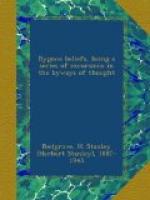[1] SIJIL ABDUL-ALI, in The Journal of the Alchemical Society, vol. ii. (1914), p. 102.
I am to a large extent in agreement with this view. Mr ABDUL-ALI quarrels with the term “analogy,” and, if it is held to imply any merely superficial resemblance, it certainly is not adequate to my own needs, though I know not what other word to use. SWEDENBORG’S term “correspondence” would be better for my purpose, as standing for an essential connection between spirit and matter, arising out of the causal relationship of the one to the other. But if SWEDENBORG believed that matter and spirit were most intimately related, he nevertheless had a very precise idea of their distinctness, which he formulated in his Doctrine of Degrees—a very exact metaphysical doctrine indeed. The alchemists, on the other hand, had no such clear ideas on the subject. It would be even more absurd to attribute to them a Cartesian dualism. To their ways of thinking, it was by no means impossible to grasp the spiritual essences of things by what we should now call chemical manipulations. For them a gas was still a ghost and air a spirit. One could quote pages in support of this, but I will content myself with a few words from the Turba—the antiquity of the book makes it of value, and anyway it is near at hand. “Permanent water,” whatever that may be, being pounded with the body, we are told, “by the will of God it turns that body into spirit.” And in another place we read that “the Philosophers have said: Except ye turn bodies into not-bodies, and incorporeal things into bodies, ye have not yet discovered the rule of operation."[1a] No one who could write like this, and believe it, could hold matter and spirit as altogether distinct. But it is equally obvious that the injunction to convert body into spirit is meaningless if spirit and body are held to be identical. I have been criticised for crediting the alchemists “with the philosophic acumen of Hegel,"[1b] but that is just what I think one ought to avoid doing. At the same time, however, it is extremely difficult to give a precise account of views which are very far from being precise themselves. But I think it may be said, without fear of error, that the alchemist who could say, “As above, so below,” ipso facto recognised both a very close connection between spirit and matter, and a distinction between them. Moreover, the division thus implied corresponded, on the whole, to that between the realms of the known (or what was thought to be known) and the unknown. The Church, whether Christian or pre-Christian, had very precise (comparatively speaking) doctrine concerning the soul’s origin, duties, and destiny, backed up by tremendous authority, and speculative philosophy had advanced very far by the time PLATO began to concern himself with its problems. Nature, on the other hand, was a mysterious world of magical happenings, and there was nothing deserving of the name of natural




